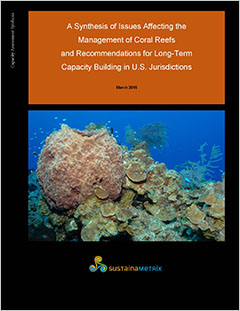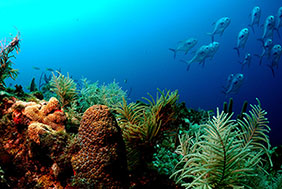-
Home
-
Data & Publications
-
Regional Portals
- About Regional Portals
- Florida
- Navassa Island
- Puerto Rico
- Flower Garden Banks
- U.S. Virgin Islands
- American Samoa
- Commonwealth of the Northern Mariana Islands
- Federated States of Micronesia
- Guam
- Main Hawaiian Islands
- Republic of the Marshall Islands
- Northwestern Hawaiian Islands
- Republic of Palau
- Pacific Remote Island Areas
-
CRCP Activities
- Glossary
A Synthesis of Issues Affecting the Management of Coral Reefs and Recommendations for Long-Term Capacity Building in U.S. Jurisdictions

Coral reef management is a complex challenge. In 2011-2014, an ambitious project was conducted to analyze the issues that affect capacity to manage coral reefs at all seven U.S. Flag Jurisdictions (jurisdictions). This activity followed a 2007 recommendation of an external panel at the conclusion of a review of National Oceanic and Atmospheric Administration‘s Coral Reef Conservation Program (CRCP). They recommended that CRCP "conduct a substantial study of the range and nature of capacity-building requirements for ongoing effectiveness of the CRCP." The work was competitively bid and awarded to SustainaMetrix with a specific focus on capacity of the US jurisdictions to implement priority actions defined in recently completed priority management plans. Mid-way through the assessment process it became evident that none of the jurisdictions were exclusively following the priority management plans. Instead, management was driven by a wide number of plans, responding to emerging and pressing issues, and following new directives not identified in the priority management plans. Thus, the SustainaMetrix team adapted their strategy in partnership with an ad-hoc Jurisdictional Capacity Assessment Team (J-CAT). Together, the J-CAT composed of a small but diverse group of coral reef management experts representing government and Non-Governmental Organizations (NGOs), academia and market forces worked in collaboration and help to steer and guide the focus of the capacity assessment process. The results are documented in a series of seven documents, one for each of the seven jurisdictions, produced and written by SustainaMetrix between 2012-2014.
Additionally, this synthesis document was prepared to examine common issues across the jurisdictions, as well as include potential short and long-term strategies to build adaptive capacity at the scale of the network of jurisdictions. While this synthesis was commissioned by and prepared for the CRCP, they cannot be expected to be the sole lead in a capacity building program to improve coral reef management. The intended audience for this document is therefore the U.S. Coral Reef Task Force (USCRTF), the All Islands Committee, as well as all state and local government agencies and the NGOs and academic communities involved in coral reef management who contribute capacity to address these persistent issues. The USCRTF and CRCP are large and mature programs and therefore deserving, particularly at this time, of a thoughtful look to the future as to what adjustments can be made to increase management of coral reefs under U.S. jurisdiction.
The purpose of the capacity assessment process is:
- To identify technical and management capacity gaps in each of the U.S. coral reef jurisdictions;
- To provide specific recommendations to address these gaps and increase effectiveness of management of U.S. coral reef ecosystems;
- To support the implementation of strategic coral reef management priorities, Local Action Strategies, and other strategic management initiatives in each jurisdiction; and,
- To better understand the roles, responsibilities, missions, capabilities and needs of management agencies.
Citation
Page, G. G. (2015). A Synthesis of Issues Affecting the Management of Coral Reefs and Recommendations for Long-Term Capacity Building in U.S. Jurisdictions. Prepared for National Oceanic and Atmospheric Administration‘s Coral Reef Conservation Program. SustainaMetrix, Baltimore, MD. 76 p.
Related Documents - Capacity Assessments for Each of the Seven Jurisdictions:
- Capacity Building Needs in American Samoa
- Capacity Building Needs in the United States Virgin Islands
- Capacity Building Needs in Puerto Rico
- Capacity Building Needs in the Main Hawaiian Islands
- Capacity Building Needs in Guam
- Capacity Building Needs in the Commonwealth of the Northern Mariana Islands
- Capacity Building Needs in Florida
For more information contact:
Glenn G. Page, President/CEO, SustainaMetrix
www.sustainametrix.com
(443) 604-6812


